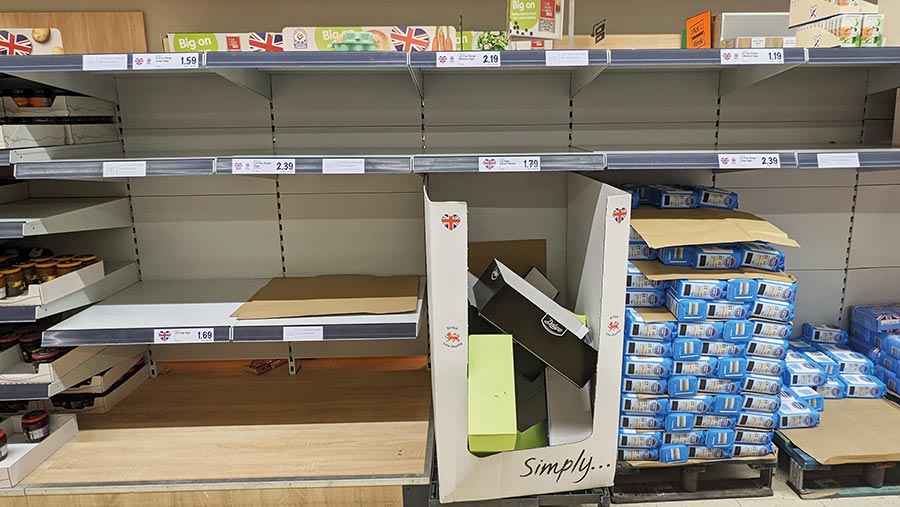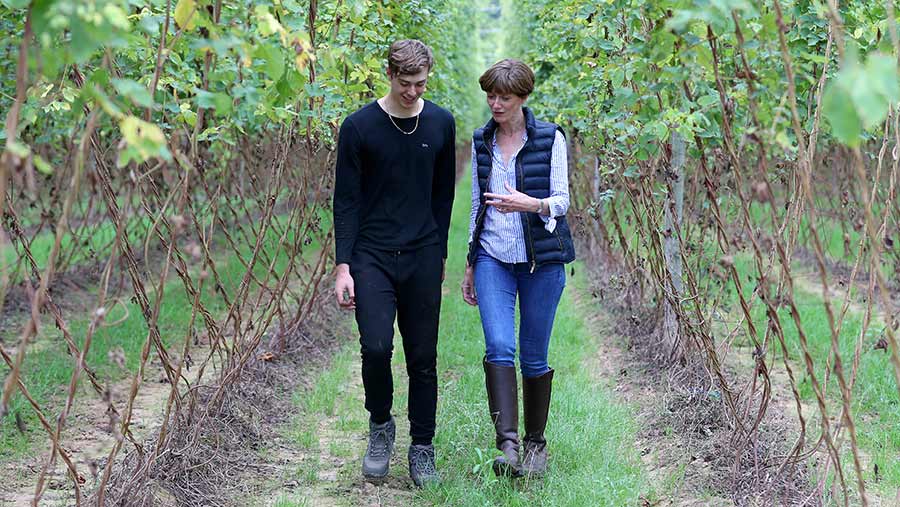OFC 2023: Report seeks fairness for farmers in food supply chain
 © Grant Falvey/LNP/Shutterstock
© Grant Falvey/LNP/Shutterstock Farmers perceive themselves in a weak negotiating position in the food supply chain, especially compared with processors, traders, wholesalers, and the large retailers.
As primary producers, most are price takers, not price makers. On most occasions, they must accept the prevailing market price for their food products.
For many, there are limited opportunities for alternative markets.
A new report launched at the Oxford Farming Conference (OFC) argues that a fairer position for farmers in the food supply chain is essential for the UK to build long-term resilience into its domestic agricultural sector.
See also: How a food giant and farmers are collaborating in supply chain
The report, Supply Chain Synergies: What is the appropriate role of supply chains in achieving responsible production at farm level?, asks what role food and farming can play in delivering positive social and environmental outcomes.
It also questions the appropriate role of policy.
5 key policy areas highlighted in the report
- Integrated political strategy – Overarching across food and farming governance, which recognises and prioritises the environmental and social dimensions of food and farming, alongside economics.
- Good food governance – For example, the Agriculture Act (2020) to provide potential mechanisms to strengthen supply chain transparency and to mandate codes of practice where voluntary action is not sufficient.
- The power of public procurement – National and local government procurement standards are a key signal for demand for new positive environmental and social outcomes, and vital to delivery of national environmental and climate ambitions.
- Trade agreements – Trading relationships have the potential to open up new avenues for export. But allowing imports produced to lower standards access to UK markets risks damaging home-grown food and farming and undercutting farmers.
- Research, innovation and skills – The shifting landscape of food and farming will require new priorities for innovation, skills and education to deliver the evidence base for change.
Farmers are the most valuable “asset” food companies have to meet their social and environmental targets, the report says.
They have “huge untapped potential” in the transition to a carbon-neutral economy and a socially just future for UK food.
Although profit margins are tight throughout the supply chain, farmers’ profits are “disproportionately small, leaving little to invest in transformation”, the report states.
In addition, investment and risk “are often borne by the farmer”.
Farmers account for 11% of people employed in the UK food system and they have by far the largest number of entreprises, the report says.
However, farming is “dwarfed” by the value chain neighbours in food trade (catering, retail and others) in terms of its revenue (see graphic below).
The transition to a more sustainable food system is being played out at a time when farmers are “being squeezed on all sides” by soaring costs for fertiliser, fuel, feed and energy, which has seen ag-inflation jump to record levels.
The cost pressures are causing farmers across a number of sectors, from beef, to eggs and fresh produce to cut back on production.
This is at a time when high-quality, affordable food supplies are desperately needed with more than a sixth of all UK households classed as food insecure.
What farmers want
Farmers interviewed for the report highlighted three core themes needed for fair and resilient supply chains in the future.
Relationships
First, supply chain relationships need rethinking.
They expressed concerns about failure to cover their costs of production, unpredictable contracts between suppliers and buyers, unfair and unreasonable notice agreements and sharing too much of the burden of rising costs.
Instead, farmers said supply chain relationships should be “characterised by reciprocity and shared negotiation, predictability, stability, confidence and sufficient resourcing to invest and innovate”.
Cost sharing
Second, farmers also highlighted the need for a genuine cost sharing of the challenge of transition.
This should include financial support to invest in new equipment, help to adopt new practices, meeting new standards, reporting and verification.
Long-term
Third, farmers called for reconfiguration of supply chains to protect the viability of their businesses for the long term.
They said the changes needed to centre on how value is determined and shared through food production, to reflect the true costs of production, environmental and social costs.
This long-term transformation should also include full chain transparency and traceability to enhance the visibility of the supply chain and its impacts.
“Shifts over time must recognise the complexity and diversity of business models, as well as full transparency, traceability and harmonisation of standards to give a true picture of the impact and value of food production,” noted Ms Mitchell.
However, there is significant potential for joint action across the supply chain, the report says.
It highlights a range of cases where “actors” along the supply chain are already co-creating solutions to deliver positive environmental and social outcomes.
For example, Nestlé is supporting its milk suppliers with a “sustainability contribution” for producing milk with a lower emissions footprint.
Similar mechanisms are used across the UK and EU dairy sectors by processors including Arla and First Milk.
Another recent example mentioned in the report was Lidl teaming up with Somerset-based cheesemaker Wyke Farms to launch Ivy’s Reserve, the first ever carbon-neutral cheddar cheese to be sold in any UK supermarket.
‘Fragmented’ policy landscape
The report calls for better integration of food and farming policy in the UK – which is often siloed and short term – towards a more joined-up approach and policymaking for the longer term.
The Groceries Code Adjudicator (GCA) plays “an important role” in the UK food system.
However, its powers are limited to ensure large supermarkets, in which 14 are currently signed up to the groceries code of practice, treat their direct suppliers lawfully and fairly.
The report says the Agriculture Act (2020) contains mechanisms for better supply chain governance for farmers, including the further creation of producer organisations to boost the bargaining power of farmer groups.
Provisions within the Act could also enable the development of mandatory codes of conduct for contractual relationships, where codes have been insufficient to deliver fairness in the supply chain.
“The development of a mandatory Dairy Code, currently in negotiation, has been a key outcome of the Agriculture Act”, the report says, adding that “the devil is in the detail” and it will only be effective “if enacted and robust”.
Ms Mitchell says the Act’s effectiveness “will depend on how far the government will proactively drive adoption of viable payment mechanisms, codes and adjudication and whether this can meet the rapid timescale of change required.”
Emily Norton, OFC 2023 chairwoman, said the impacts of a long history of supply chain practices that had driven efficiencies over values was “now coming home to roost”.
This is because of the energy and food shocks triggered by the conflict in Ukraine.
“This report goes a long way to highlight the good practice that supply chains are already developing to reshape our food system in response to the climate, biodiversity, and health crises that our consumption-based economy has inflicted on us,” she added.
“It further challenges policymakers and markets to work together in an ambitious cycle of improvement as we seek to farm a more optimistic and healthier future, in which farmers are central to the solutions we need.”
About the research
For the research, Forum for the Future carried out 30 interviews in the autumn with leading players across UK food production and beyond.
This included farmers, farming union and levy board representatives, academics, finance experts, policymakers and advisers.
The aim was to explore the barriers to supply chain transformation and identify pathways to change.
The interviews were undertaken under Chatham House rules of non-attribution.
The study was authored by Lesley Mitchell, associate director for sustainable nutrition at the Forum for the Future, in partnership with the OFC, Savills and World Wide Fund for Nature.
Case study: Ali Capper, fruit and hops grower, Worcestershire
British hop growers have faced significant rises in their energy, fertiliser and labour costs since the Covid-19 pandemic.
Ali Capper, who runs Stocks Farm, a 200-year-old hop and fruit farm on the Herefordshire/Worcestershire border, says farmgate prices have not kept pace with soaring costs.

Ali Capper (right) with a student worker in a hop yard © Ali Capper
Unless British hop growers are paid fairer prices, she fears the industry will shrink and breweries will have to import more hops, which would hugely increase the carbon footprint.
“In 2019, a good price was £9/kg from the farmgate to the merchants. That price needs to be £12.50/kg today,” Ms Capper says.
At Stocks Farm, about 40ha of hops are grown each year and the crop is harvested by automation over five weeks from the end of August.
The UK hop growing industry is not subsidised, and in the past three years, Ms Capper says this side of her business has been building debt.
After two years of producing less crop (2020 and 2021) to avoid oversupply in the wake of Covid and less demand from breweries, most hop growers were given contract certainty to increase supply for 2022.
But a bad hop harvest this year, caused by prolonged dry weather, saw yields drop by 30% at Stocks Farm and as much as 50% on other farms.
“We really need our supply chain to recognise the inflation we’re facing in our crop, pay us fairer prices and give us the certainty of the three- or five-year contracts we had before Covid,” says Ms Capper.
She understands that breweries and pubs have also faced challenges since Covid; the cost of glass and duty “has gone through the roof”.
But Ms Capper says hops are a “minor contributor” compared to these other increased costs.
“We have got a government of free marketeers that just wants cheap food and they don’t care where it comes from,” she adds.
“We are so different to other countries. In New York, there are tax incentives for cider makers to use locally produced apples. Things like this are just not built into government policy. That’s the problem.”
